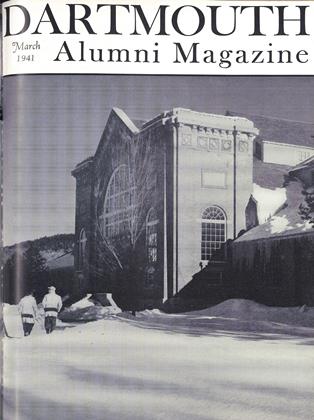by Richard Eberhart '26.Chatto and Windus* London, 1940, p. 55.6 shillings.
Constant, exquisite outrage of the fine intelligence is the cause of a great deal of poetry in the middle twentieth century. Violence offered to sensitivity is fended off by superbly organized nerves and intellect; the stroke that was to kill merely bruises. But it bruises every day, and, sooner or later, this superior organism cries out in protest; as it must. But the perfection of conduct, the pure, honest superior skill well used, the impossible goal always in sight, these torture the fine intelligence insofar as they are made difficult, or absurd, or of a carelessly tolerated necessity. These excellent qualities are always present, always under-valued, always deeply troubled
His [Richard Eberhart's] first two books were not easy reading, even for the willing: unless the reader were like the poet, troubled, bruised. The density of language, the privacy and subtlety of image and concept and rhythm, made it an exercise of loyalty to read a greater
*Obtainable at the Grolier Bookshop, Cambridge, Mass., or the Holiday Bookshop, New York City.
part of the poems. In the new book, a new clarity appears.
If one may name poems the reader of a review will not know unless he reads the book (and of course he should read the book) the poems most satisfying on the highest level are "Two Loves," "Grave Piece," "Recollection of Childhood," "Rumination," "The Humanist," "A Meditation," and the following poem, which closes the book, explains Mr. Eberhart.
The full of joy do not know; they need not Know. Noth is reconciled. They flash the light of Heaven indeed. Let them have it, let them have it, it is mild.
Those who suffer see the truth; it has Murderous edges. They never avert The gaze of calculation one degree, But they are hurt, they are hurt, they are hurt.
At another extreme of the new boundary Mr. Eberhart has made, by what I think an enlargement, is still the poem like "Realm" or, at a more dangerous outpost, "The Virgin." The latter piece is the more strained because of other poems in the book on the same subject, better poems. Turning again, one finds some poems on the artist's predicament, which is as legitimate as man's predicament for subject-matter. The tone of the whole book is, in Mr. Eberhart's own words, "forceful, solemn, pure, purposive." It is also, and as a consequence, poetically exciting, and deeply moving.
[Reprinted through the courtesy of the Boston Evening Transcript and John Holmes.]
There has been published in Philadelphia by the American College of Physicians a book of 275 pages entitled The American College ofPhysicians—lts First Quarter Century. This well printed and illustrated volume is edited by Dr. William Gerry Morgan '90, former President of the American Medical Association. The historical part of the volume was written by Dr. Morgan who became a Fellow of the American College of Physicians in 1916, and who since that date has been closely associated with its management. The three chapters by Dr. Morgan are "The Founding of the College"; "The Presidents of the College"; and "Other Officers." This volume undoubtedly will be of interest to Dartmouth men in the medical pro fession.
There has just been printed at the PhaneufPress of Nashua, New Hampshire, a bound volume of 79 pages The Story of the NewHampshire Medical Society—Told to 1854 byLyman Bartlett M.D. at the Centennial of theSociety in 1891, Revised and Continued byHenry O. Smith M.D. This volume is printed for the 150th anniversary of the Society which will be celebrated this year. Dr. How was a graduate of the College in iB6O and of the Dartmouth Medical School in 1863. Dr. Smith, who continued the story begun by Dr. How, was a member of the class of 1886. This volume should be of general interest to all those interested in the history of medicine in New Hampshire, and to Dartmouth physicians who have been connected with the Society.
 View Full Issue
View Full Issue
More From This Issue
-
 Article
ArticleLewis Parkhurst, Trustee
March 1941 By Edward K.Robinson '04 -
 Article
ArticleGreece and Daniel Webster
March 1941 -
 Article
ArticleBig Green Teams
March 1941 By Whitey Fuller '37 -
 Article
ArticleThe Undergraduate Chair
March 1941 By Charles Bolte '41. -
 Class Notes
Class Notes1921*
March 1941 By CHARLES A. STICKNEY JR. -
 Article
ArticleA Generation Finding Itself
March 1941
Books
-
 Books
BooksSTRATEGY AND COMMAND: THE FIRST TWO YEARS.
OCTOBER 1963 By ERNEST H. GUSTI '43 -
 Books
BooksTHE PAPERS OF DANIEL WEBSTER. CORRESPONDENCE, VOLUME I.
January 1975 By JOHN SLOAN DICKEY '29 -
 Books
BooksTHE EUROPEAN ANCESTRY OF VILLON'S SATIRICAL TESTAMENTS
February 1942 By Leon Verriest -
 Books
BooksORNAMENTAL INITIALS: THE WOODCUT INITIALS OF CHRISTOPHER PLANTIN.
January 1975 By RAY NASH -
 Books
BooksJoseph Hawley, Colonial Radical
DECEMBER 1931 By Robert E. Riegel -
 Books
BooksIN TIMES LIKE THESE
February 1943 By Wm. Stuart Messer.

